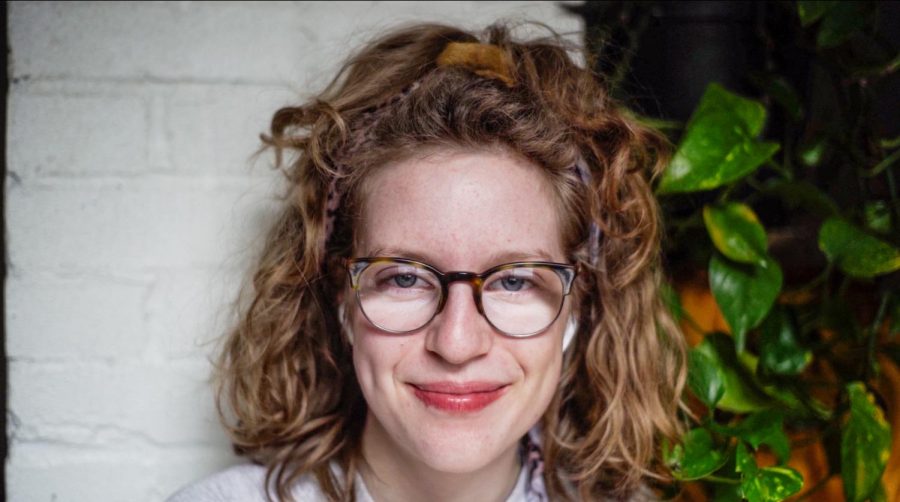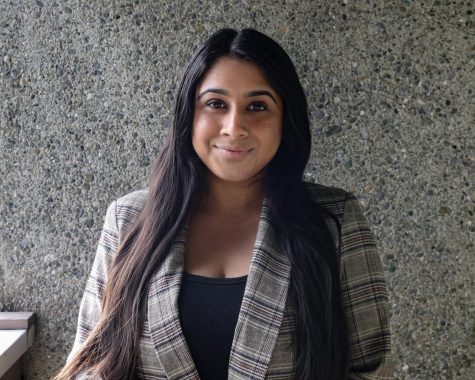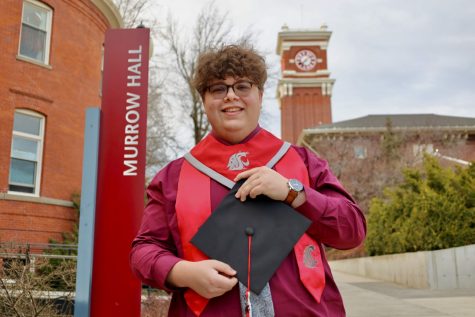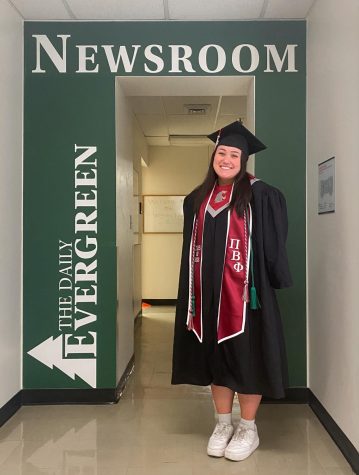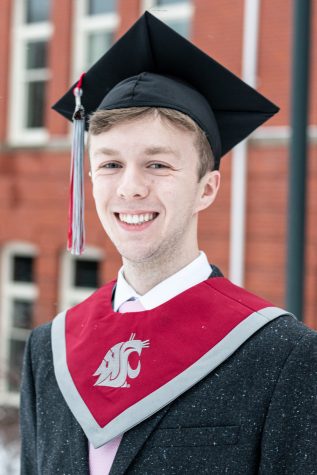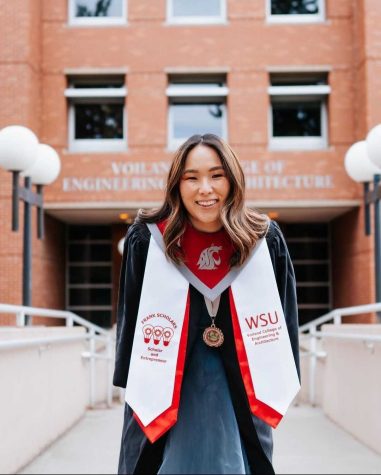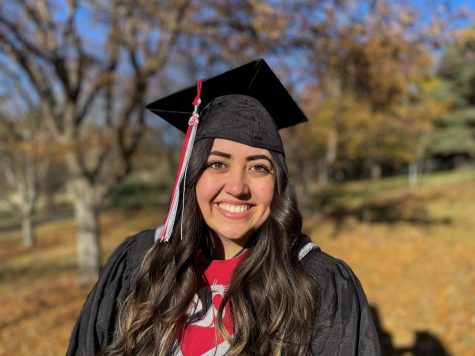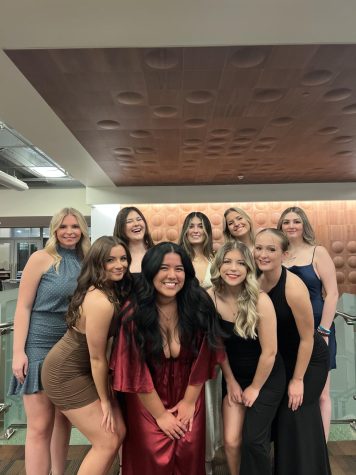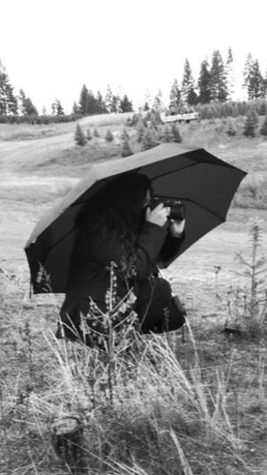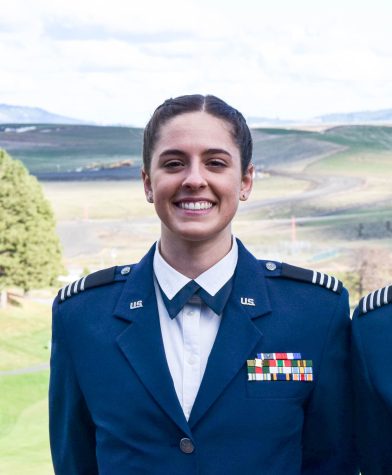Founder of WSU PERIOD graduates, hopes to continue activism
Aydan Garland-Miner will continue fighting for menstrual equity with PERIOD after leaving WSU chapter
COURTESY OF AYDAN GARLAND-MINER
When Aydan Garland-Miner is not doing activism work, she is often reading nonfiction.
April 28, 2022
During a Zoom call on May 3, 2021, Aydan Garland-Miner and members of the Washington State for Menstrual Equity Coalition watched Gov. Jay Inslee sign House Bill 1273 into law. Emotions ran high as everybody cried and celebrated together because, after this day, public schools in Washington would provide free menstrual products in bathrooms.
Garland-Miner, senior Women’s, Gender, and Sexuality Studies and broadcast production double major, is the founder of the WSU chapter of PERIOD, which she started when she was a sophomore in 2018.
It all started when Garland-Miner read a book called “Period Power: A Manifesto for the Menstrual Movement” by Nadya Okamoto, the founder of the PERIOD organization. PERIOD is a nonprofit organization that provides support for those who face period poverty. It strives to promote menstrual equity, according to the WSU Women*s Center website.
Garland-Miner was interested in the history of periods, period stigma and period poverty, which she read about in the book, she said.
“When I looked whether WSU had a chapter, I noticed that the University of Washington had a chapter, and we didn’t, so I decided to look into starting one,” she said.
After that, Garland-Miner said she helped recruit people through tabling, and after getting people to join, she led the club from March 2018 to August 2021. Since then, she joined Period. Inc. as a Northwest Regional Lead to help the chapters in Washington, Oregon, Montana, California and Alaska eradicate period poverty and stigma. She will continue working there after graduation.
During her time with PERIOD at WSU, Garland-Miner led distribution trips to Spokane and occasionally locally, in Pullman and Moscow. During these trips, Garland-Miner and PERIOD members packaged menstrual pads, tampons and other products, and took them to Spokane to distribute to homeless individuals.
“We hear about period poverty a lot; I think the way that we view people who are experiencing homelessness is very dehumanized,” Garland-Miner said. “I just remember the first [distribution trip] being very emotionally intense.”
During the peak of COVID-19 in April 2021, Garland-Miner said they went to Spokane and thought they packed a good amount of period packs, assuming there would not be as many homeless people on the streets because of the pandemic. However, she was met with a surprise.
“It seemed like there were so many more [homeless people] than we had ever seen. We ran out of period packs, which we had never done before,” Garland-Miner said. “COVID was a huge concern, not for us necessarily, but for people that are living on the streets.”
She said they had to ration the period packs, and she wanted to make sure everyone who needed one got some menstrual products.
Throughout her time with PERIOD, Garland-Miner spoke at events and led workshops to spread awareness and reduce the stigma of periods.
However, one of her most notable successes is when she helped with the legislation HB 1273, the bill that makes free menstrual products available in campus bathrooms. Garland-Miner, along with members of the Washington State for Menstrual Equity Coalition, testified in support of the bill.
Garland-Miner and her friend Agatha Campana Tutia founded the coalition with the goal of getting the legislation off the ground.
Washington State Representative April Berg introduced HB 1273, and Garland-Miner provided written testimony over Zoom during the sessions, along with members of the coalition and advocates from different equity organizations, she said.
“I had talked on my Instagram about inviting people to come to the Zoom [hearings] and then helping them write emails to their representatives in their district to urge them to support the bill,” she said.
Once the bill passed with bipartisan support, Garland-Miner said she felt happy, as did everyone else who provided testimony or supported the legislation. The coalition members had their own Zoom call to watch Inslee sign the bill.
Garland-Miner said she received or will be receiving many awards because of her work, including the WSU Alumni Association’s Top Ten Senior Award, Outstanding Senior from the College of Arts and Sciences (School of Languages, Culture, and Race) and the Celia Forrest Women’s, Gender, and Sexuality Studies Award.
“Aydan is an incredible human being. It’s an inside joke that whenever we catch up, it’s like she’s won six more awards or something, and she mentions it super nonchalantly,” said Alexa Branch, a WSU alum and former PERIOD member.
Branch said she and Garland-Miner have been friends since her freshman year. She was part of PERIOD for two years, and was vice president for one of those years.
“She had a lot of the big ideas, and I sampled all of the nitty-gritty details of things,” she said.
Branch said they hosted workshops together, made care kits and led outreach events on campus. Their professional relationship also worked in their personal one like a “cohesive machine.”
When Garland-Miner is not doing activism work, she is often reading nonfiction. She has recently started to read more fiction books, she said.
“For a while, when I was doing all this great stuff, I would have told you I had no life outside of [PERIOD], but now I have free time,” she said.
Along with reading, Garland-Miner started taking two music classes and spends time in Kimbrough Hall and the practice room in the Chinook Student Center to practice piano and sing.
Garland-Miner said she loves spending time with her friends and having intimate gatherings with good conversation.
After graduation, she said she will move back to her hometown near Bellingham, Washington, where she hopes to work at College Advising Corps, which helps high school seniors get into college.
However, Garland-Miner’s activism is not ending, as she will be continuing her work with PERIOD and working to get more funding for HB 1273.

